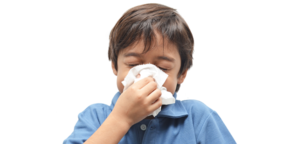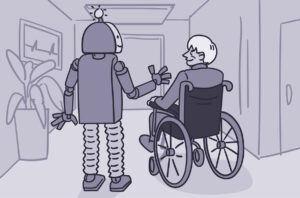- Controlling elevated temperature
- Set Point:
- The temperature around which body temperature is regulated by a thermostat-like mechanism in the hypothalamus.
- Fever (hyperpyrexia):
- An elevation in set point such that body temperature is regulated at a higher level; may be arbitrarily defined as a temperature above 38 degrees Celsius (100.4 degrees F)
- Fever management
- Most effective intervention is the use of antipyretics to lower the set point.
- Antipyretics include: Aspirin, acetaminophen, and nonsteroidal anti-inflammatory drugs (NSAIDs).
- Acetaminophen is the preferred drug.
- Aspirin should NOT be given to children because of its association with influenza virus or chicken pox and Reye Syndrome.
- Cooling Measures: Wear minimal clothing, exposing the skin to the air, reducing room temperature, increasing air circulation, and applying cool, moist compresses to the skin.
- Be aware that febrile seizures can occur.
- Hyperthermia:
- Body temperature exceeding the set point, which usually results from the body or external conditions creating more heat than the body can eliminate, such as in heat stroke, aspirin toxicity, seizures, or hyperthyroidism.
- Unlike in fever, antipyretics are of no value in hyperthermia because the set point is already normal
- Cooling measures are used.
- Commercial cooling devices such as blankets or mattresses are also used.
- Body temperature exceeding the set point, which usually results from the body or external conditions creating more heat than the body can eliminate, such as in heat stroke, aspirin toxicity, seizures, or hyperthyroidism.
- Set Point:

Flu and People with Diabetes
r Everyone MAR. 20, 2024 PREVENTION AND CONTROL OF SEASONAL INFLUENZA WITH VACCINES: RECOMMENDATIONS OF THE ADVISORY COMMITTEE ON IMMUNIZATION PRACTICES — UNITED STATES, 2025-2026



